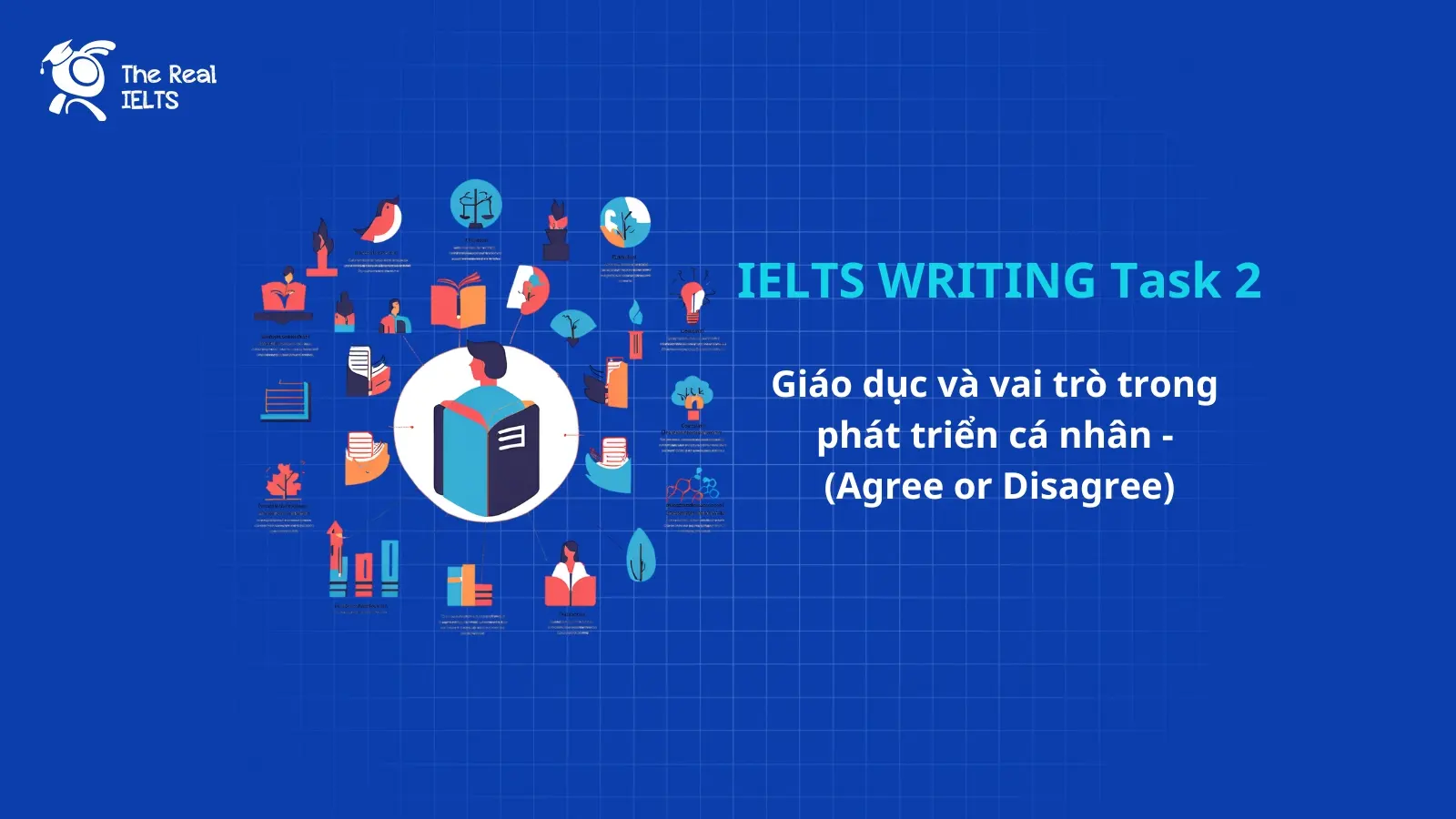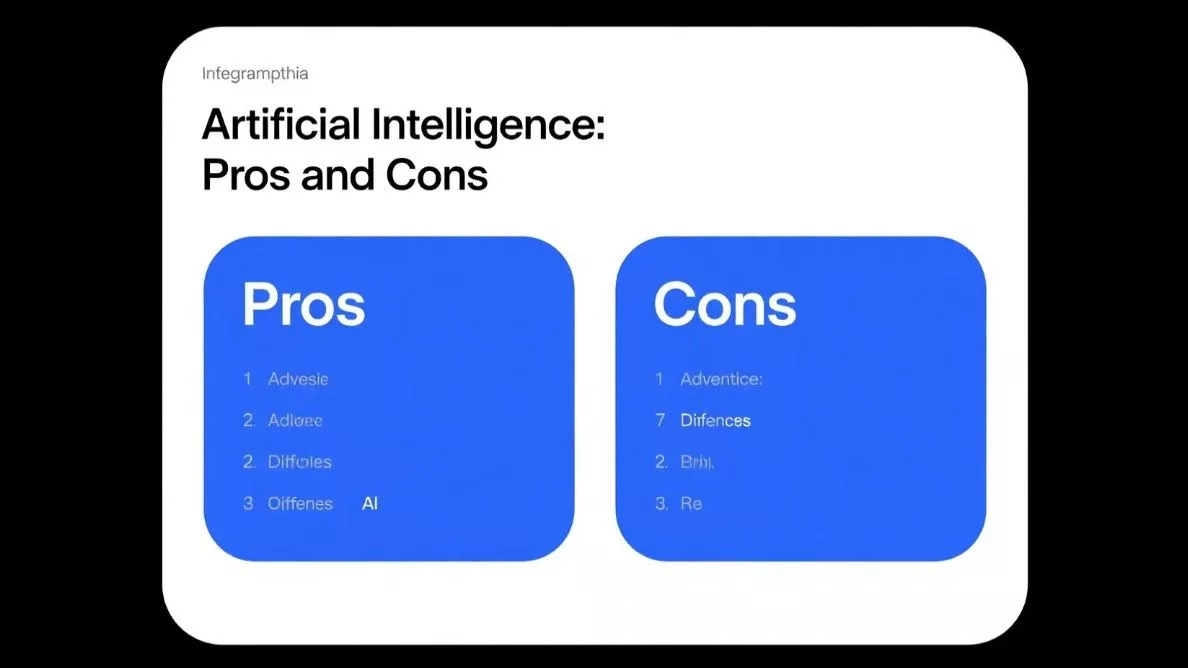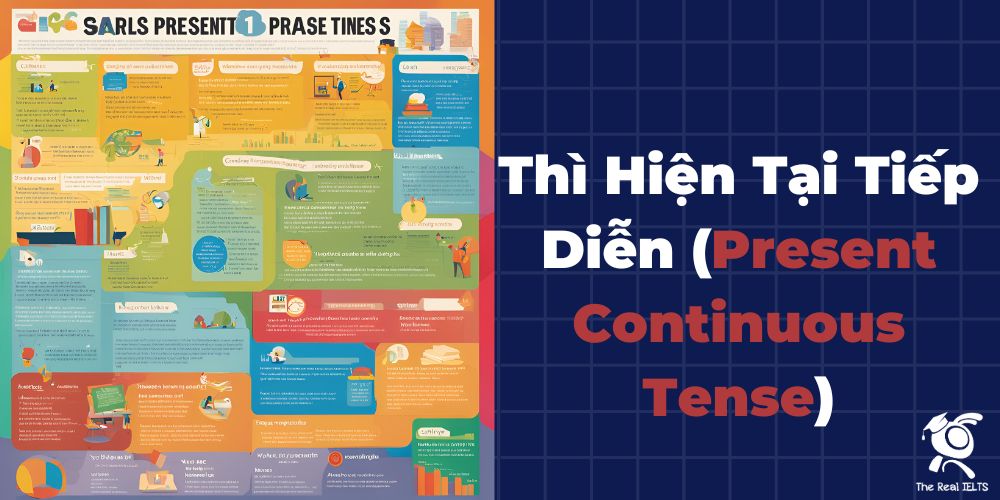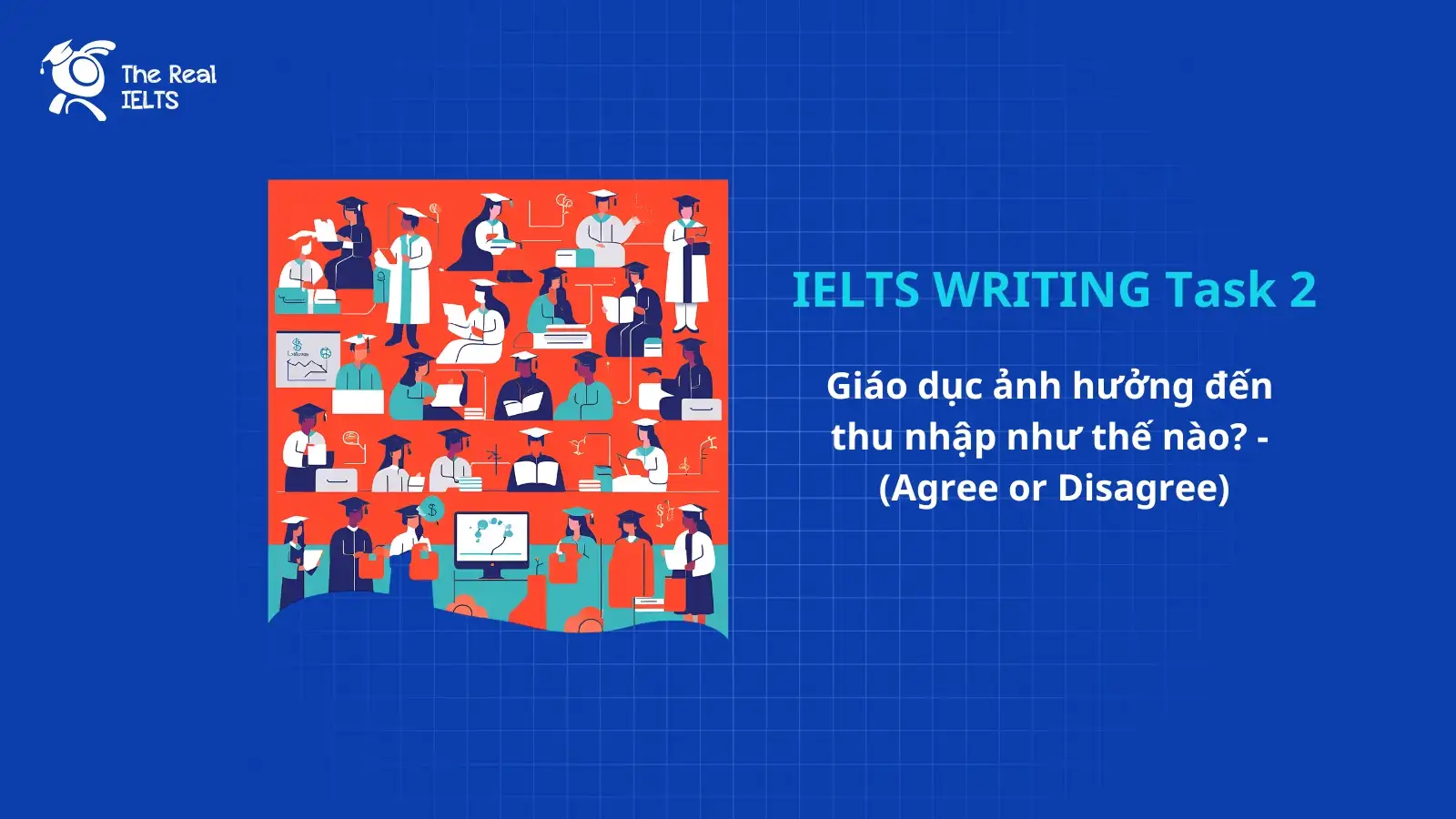IELTS Writing Task 2 yêu cầu thí sinh thể hiện quan điểm về nhiều vấn đề quan trọng, trong đó giáo dục và sự phát triển cá nhân là một chủ đề phổ biến. Một số người cho rằng giáo dục đóng vai trò then chốt trong việc định hình tương lai của mỗi cá nhân. Vậy quan điểm này có thực sự chính xác?
Đọc thêm: IELTS Writing Task 2: Giáo dục là nền tảng của xã hội phát triển – Two-part Question Essay
Đề bài IELTS Writing Task 2: Giáo dục và vai trò trong phát triển cá nhân – Opinion Essay (Agree or Disagree)
Education is the most important factor in personal development.” To what extent do you agree or disagree
Câu trả lời 1
Education has long been regarded as a crucial element in shaping an individual’s personal and professional life. While some argue that it is the most important factor in personal development, others believe that aspects such as life experiences, social interactions, and personal motivation play an equally or even more significant role. This essay will explore both perspectives before presenting a final viewpoint.
On the one hand, education provides individuals with the knowledge and skills necessary to navigate life and achieve success. Formal education fosters critical thinking, problem-solving abilities, and intellectual growth, all of which are essential for personal development. Moreover, education exposes individuals to diverse perspectives, cultures, and ideas, helping them develop empathy and a broader worldview. For instance, a well-educated person is more likely to make informed decisions regarding their career, health, and personal relationships.
On the other hand, personal development is not solely dependent on formal education. Many successful individuals, such as entrepreneurs and artists, have achieved great accomplishments without extensive schooling. Factors such as resilience, adaptability, emotional intelligence, and practical experience often play a decisive role in shaping a person’s character and capabilities. Additionally, social interactions with family, friends, and mentors can significantly influence personal growth by fostering confidence, emotional well-being, and interpersonal skills.
In conclusion, while education is undoubtedly a vital factor in personal development, it is not the only determining element. Life experiences, social connections, and intrinsic motivation also contribute significantly to an individual’s growth. Therefore, personal development should be viewed as a holistic process that extends beyond formal education.
Câu trả lời 2
Education plays a crucial role in personal development, but claiming it’s the most important factor is an oversimplification. While it’s undoubtedly a powerful catalyst, other elements like life experiences, personal traits, and social environment also contribute significantly.
Arguments for Education’s Importance:
- Knowledge and Skills: Education equips individuals with foundational knowledge and practical skills, empowering them to navigate the complexities of life. This includes critical thinking, problem-solving, communication, and adaptability, all vital for personal growth.
- Expanded Opportunities: Education opens doors to better career prospects, higher earning potential, and increased social mobility. This improved socioeconomic standing can contribute to greater self-esteem and a wider range of life choices.
- Personal Growth and Self-Awareness: Exposure to diverse perspectives and ideas through education fosters critical thinking, self-reflection, and a deeper understanding of oneself and the world. This can lead to increased self-awareness and a more refined sense of purpose.
- Social and Civic Engagement: Education promotes informed citizenship and encourages individuals to participate actively in their communities. This involvement can lead to personal fulfillment and a stronger sense of belonging.
Arguments Against Education Being the Most Important Factor:
- Life Experiences: Experiences outside the classroom, such as travel, work, relationships, and challenges overcome, often shape character and values more profoundly than formal education. These experiences teach resilience, adaptability, and emotional intelligence.
- Innate Traits: Personal qualities like curiosity, perseverance, and resilience are inherent to some individuals and contribute significantly to their personal development, regardless of their educational attainment.
- Social Environment: Family, friends, and community play a vital role in shaping an individual’s values, beliefs, and social skills. A supportive and nurturing environment can foster personal growth even in the absence of formal education.
- Access and Quality: The quality and accessibility of education vary drastically across the globe. For many, formal education is simply not an option, yet they still achieve remarkable personal growth through other means. Moreover, even access to quality education doesn’t guarantee personal development.
Conclusion:
Education is undoubtedly a significant driver of personal development, providing individuals with the tools and knowledge necessary to thrive. However, it’s not the sole determinant. Personal growth is a complex and multifaceted process shaped by a combination of education, life experiences, individual traits, and social influences. While prioritizing education is essential for individual and societal advancement, recognizing the importance of these other factors provides a more holistic and accurate understanding of personal development.
Câu trả lời 3
Education plays a crucial role in shaping an individual’s personal development by providing knowledge, skills, and values necessary for success in life. However, while education is undeniably important, other factors such as personal experiences, family environment, social interactions, and innate abilities also significantly influence personal growth. This essay will examine both perspectives before concluding that while education is a key factor, it is not the sole determinant of personal development.
On the one hand, education provides individuals with intellectual growth, critical thinking skills, and opportunities for self-improvement. Formal education helps individuals acquire knowledge in various fields, develop problem-solving abilities, and gain qualifications that enhance career prospects. Furthermore, education promotes moral and ethical values, encouraging individuals to become responsible and informed citizens. For example, subjects such as history and literature teach lessons about human behavior and ethics, fostering emotional intelligence and empathy. Additionally, education enhances communication skills, confidence, and adaptability—qualities that contribute to personal and professional success.
On the other hand, personal development is influenced by various non-academic factors. Life experiences, such as overcoming challenges, traveling, or engaging in social activities, help individuals develop resilience, adaptability, and emotional intelligence. Family upbringing also plays a crucial role, as values instilled at home often shape a person’s behavior and decision-making. Moreover, social interactions, friendships, and mentorships contribute to character development, offering real-world learning that cannot always be acquired in a classroom. For instance, some successful individuals, such as entrepreneurs and artists, have achieved great personal growth through self-learning, mentorship, and experience rather than formal education.
In conclusion, while education is a vital factor in personal development, it is not the only one. A combination of education, personal experiences, family influence, and social interactions collectively shape an individual’s growth. Therefore, while education lays a strong foundation, other aspects of life also play an equally important role in personal development.
Câu trả lời 4
The statement that “Education is the most important factor in personal development” is a widely debated topic. While education plays a crucial role in shaping an individual’s knowledge, skills, and opportunities, other factors such as personal experiences, environment, social interactions, and emotional intelligence also contribute significantly to personal growth.
Arguments in Favor
- Knowledge and Skills – Education provides individuals with the necessary knowledge and skills to navigate life, make informed decisions, and contribute to society.
- Critical Thinking and Problem-Solving – A good education encourages analytical thinking, creativity, and problem-solving skills.
- Career and Financial Stability – Education often leads to better job opportunities, financial independence, and improved living standards.
- Personal Confidence and Empowerment – Learning boosts self-confidence and the ability to communicate and express ideas effectively.
- Moral and Ethical Development – Formal education often instills values, ethics, and social responsibility.
Arguments Against
- Life Experiences and Practical Knowledge – Many aspects of personal development come from real-life experiences, failures, and successes rather than formal education.
- Emotional Intelligence and Relationships – Personal development is also shaped by emotional intelligence, self-awareness, and interpersonal relationships, which are not always taught in schools.
- Family and Social Environment – The way a person is raised, their cultural background, and their social interactions play a significant role in shaping character and behavior.
- Self-Motivation and Personal Efforts – Some highly successful individuals have achieved greatness through self-learning, resilience, and determination rather than formal education.
Conclusion
While education is undoubtedly a vital factor in personal development, it is not the only factor. Personal experiences, relationships, emotional intelligence, and self-motivation also play a crucial role. Therefore, while I agree that education is important, I believe that a holistic approach combining formal education with life experiences and personal growth efforts is essential for true personal development.
Câu trả lời 5
Education is often regarded as a crucial element in personal development, as it provides individuals with knowledge, skills, and opportunities for growth. However, personal development is influenced by multiple factors, including life experiences, social interactions, and personal motivation. While education plays a significant role, it is not the sole determinant of an individual’s growth. This essay will argue that although education is essential, other factors are equally important in shaping personal development.
One of the primary reasons education is considered a key factor in personal development is that it equips individuals with intellectual and practical skills necessary for success. Formal education enhances cognitive abilities, critical thinking, and problem-solving skills, enabling people to navigate challenges effectively. Moreover, education broadens perspectives by exposing individuals to diverse ideas and cultures, fostering personal growth and adaptability. Higher levels of education are also linked to better career opportunities, financial stability, and improved social status, all of which contribute to an individual’s overall development.
However, personal development is a multifaceted process influenced by various non-academic factors. Life experiences, such as overcoming adversity, traveling, or engaging in extracurricular activities, shape an individual’s character and resilience. Furthermore, social interactions with family, peers, and mentors play a crucial role in emotional and psychological growth. Many successful individuals attribute their achievements not only to formal education but also to self-discipline, ambition, and real-world experiences. Additionally, intrinsic motivation and lifelong learning are vital aspects of development that extend beyond traditional schooling.
In conclusion, while education is a fundamental factor in personal development, it is not the only determinant. Life experiences, social relationships, and personal drive also contribute significantly to an individual’s growth. Therefore, a balanced approach that values both formal education and experiential learning is essential for holistic personal development.
Câu trả lời 6
Education is often regarded as a crucial pillar of personal development, as it equips individuals with knowledge, skills, and opportunities for growth. While education plays an undeniably significant role in shaping a person’s intellectual and professional life, other factors such as life experiences, social interactions, and personal motivation also contribute to overall development. This essay argues that while education is highly important, it is not the sole determinant of personal growth.
Firstly, education provides individuals with essential knowledge and skills that are necessary for personal and professional advancement. Formal education enhances cognitive abilities, improves critical thinking, and fosters problem-solving skills. For instance, individuals who receive a quality education are more likely to secure stable employment and make informed decisions in their lives. Furthermore, education promotes values such as discipline, perseverance, and responsibility, which are fundamental to character development.
However, personal development extends beyond formal education. Life experiences play a vital role in shaping an individual’s personality and worldview. For example, traveling, engaging in social activities, and overcoming challenges contribute to emotional intelligence and adaptability, which are essential for growth. Many successful entrepreneurs and influential figures have achieved great personal development through practical experiences rather than formal education alone.
Moreover, personal motivation and self-discipline are key factors in individual growth. A person’s willingness to learn, explore, and improve themselves often determines their success more than formal education. For instance, self-taught individuals in fields such as technology and art have demonstrated that passion and perseverance can lead to remarkable achievements without formal schooling.
In conclusion, while education is an essential factor in personal development, it is not the only one. Life experiences, social interactions, and personal drive also play crucial roles in shaping an individual. Therefore, personal development is best achieved through a combination of formal education and real-world experiences.
Câu trả lời 7
Education is often considered a cornerstone of personal development, influencing an individual’s knowledge, skills, and worldview. While I agree that education plays a vital role in shaping personal growth, I believe that other factors, such as family, social environment, and personal experiences, are equally significant in contributing to overall development.
On one hand, education provides individuals with essential knowledge and critical thinking skills. Formal education exposes people to a wide range of subjects, fostering intellectual growth and helping them develop problem-solving abilities. It also instills discipline, time management, and communication skills, all of which are crucial for personal and professional success. Moreover, education often opens doors to better career opportunities, leading to financial stability and increased self-confidence, both of which contribute to personal growth.
On the other hand, personal development is not solely dependent on education. Family upbringing plays a fundamental role in shaping a person’s values, ethics, and emotional intelligence. For instance, children raised in nurturing environments often develop strong interpersonal skills and a healthy sense of self-worth. Additionally, life experiences, such as traveling, facing challenges, or participating in social activities, can significantly influence personal growth. These experiences teach resilience, adaptability, and empathy—qualities that are not always acquired through formal education.
Furthermore, social interactions and relationships are critical components of personal development. Engaging with diverse groups of people helps individuals broaden their perspectives, improve their communication skills, and develop emotional intelligence. In many cases, people grow through real-life experiences that challenge their beliefs and encourage self-reflection, which formal education alone may not provide.
In conclusion, while education is undoubtedly an important factor in personal development, it is not the sole determinant. Family influence, social interactions, and life experiences are equally essential in shaping a well-rounded individual. Therefore, I believe that personal development results from a combination of education and other life factors.
Câu trả lời 8
Education plays a significant role in personal development, but claiming it’s the most important factor is an oversimplification. I partially agree with the statement, recognizing its importance while acknowledging other crucial influences.
Arguments for Education’s Importance:
- Knowledge and Skills Acquisition: Education equips individuals with foundational knowledge and practical skills necessary for navigating the complexities of life. It fosters critical thinking, problem-solving abilities, and adaptability, all crucial for personal growth.
- Expanded Opportunities: Education opens doors to diverse opportunities, be it higher education, career advancement, or personal enrichment pursuits. It empowers individuals to pursue their goals and aspirations.
- Increased Self-Awareness: Exposure to different perspectives and ideas through education broadens horizons and encourages introspection. This can lead to greater self-awareness, understanding of one’s values, and a clearer sense of purpose.
- Social and Emotional Development: The educational environment fosters social interaction, collaboration, and the development of interpersonal skills. It provides opportunities for individuals to learn about different cultures, build relationships, and navigate social situations.
- Economic Empowerment: Education is strongly correlated with higher earning potential, leading to greater financial stability and independence, which can contribute significantly to personal well-being.
Arguments Against Education Being the Most Important Factor:
- Life Experiences: Experiences outside the formal education system, such as travel, work, relationships, and personal challenges, contribute significantly to personal growth. These experiences shape character, build resilience, and offer invaluable life lessons.
- Innate Traits and Abilities: Individual personality traits, inherent talents, and natural aptitudes play a crucial role in shaping personal development. While education can nurture these qualities, it cannot create them.
- Personal Motivation and Drive: Intrinsic motivation, self-discipline, and a proactive approach to learning are essential for personal growth. Education can provide the tools, but the individual’s drive ultimately determines their development trajectory.
- Socioeconomic Factors: Access to quality education is not universal. Socioeconomic disparities can limit opportunities for certain individuals, highlighting that factors beyond education can significantly impact personal development.
- Mentorship and Guidance: The influence of mentors, role models, and supportive relationships can be profoundly impactful on personal development. These individuals offer guidance, support, and inspiration, which can be as valuable as formal education.
Conclusion:
Education is undoubtedly a powerful catalyst for personal development, providing essential knowledge, skills, and opportunities. However, it’s not the sole determinant. Personal experiences, innate traits, individual motivation, socioeconomic circumstances, and the influence of others all play interconnected roles in shaping who we become. A holistic approach that recognizes the importance of education alongside these other factors offers a more accurate understanding of personal development.















